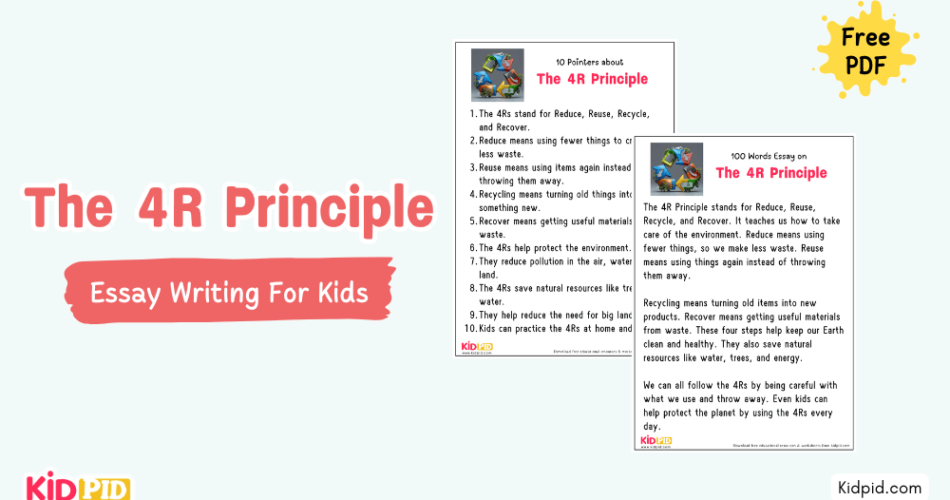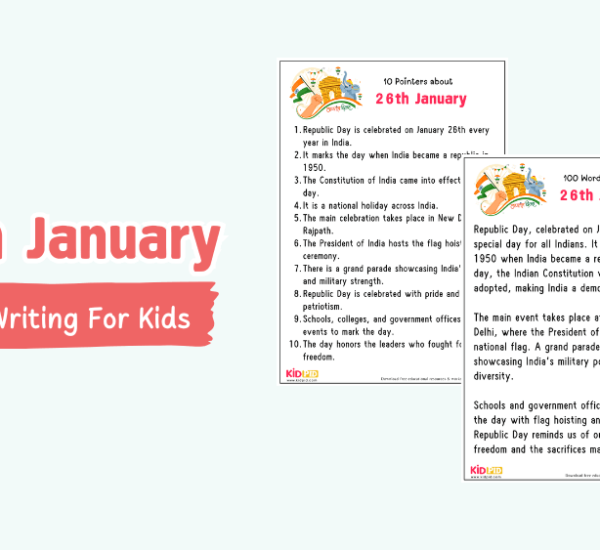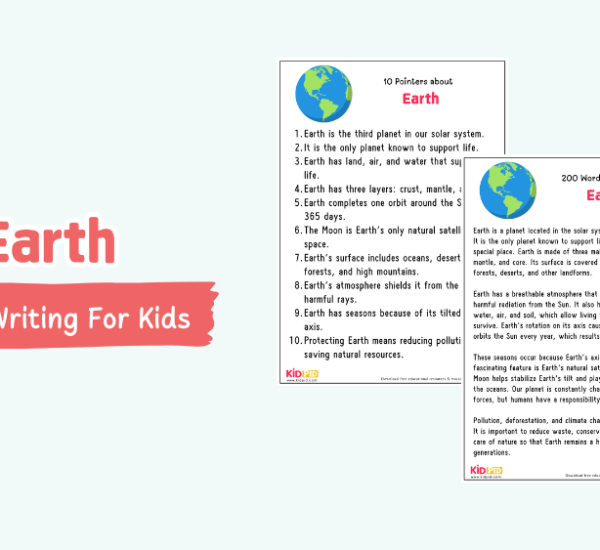The 4R Principle—Reduce, Reuse, Recycle, and Recover—is a simple yet powerful way to protect our environment. This essay, with 10 important pointers and questions, helps students understand how these eco-friendly practices save resources, reduce waste, and promote sustainability in daily life.
10 Pointers About The 4R Principle

- The 4Rs stand for Reduce, Reuse, Recycle, and Recover.
- Reduce means using fewer things to create less waste.
- Reuse means using items again instead of throwing them away.
- Recycling means turning old things into something new.
- Recover means getting useful materials from waste.
- The 4Rs help protect the environment.
- They reduce pollution in the air, water, and land.
- The 4Rs save natural resources like trees and water.
- They help reduce the need for big landfills.
- Kids can practice the 4Rs at home and school.
Short Essay On The 4R Principle
Essay On The 4R Principle in 100 Words

The 4R Principle stands for Reduce, Reuse, Recycle, and Recover. It teaches us how to take care of the environment. Reduce means using fewer things, so we make less waste. Reuse means using things again instead of throwing them away. Recycling means turning old items into new products. Recover means getting useful materials from waste. These four steps help keep our Earth clean and healthy. They also save natural resources like water, trees, and energy. We can all follow the 4Rs by being careful with what we use and throw away. Even kids can help protect the planet by using the 4Rs every day.
Essay On The 4R Principle in 200 Words

The 4R Principle is an important way to help our Earth. It stands for Reduce, Reuse, Recycle, and Recover. Each R teaches us how to take care of the environment. Reduce means using less. We can reduce waste by using only what we need. For example, don’t waste water or paper. Reuse means using things again. Instead of throwing away old clothes or bottles, we can find new ways to use them. Recycling means changing old things into something new. Paper, plastic, and cans can be recycled to make new items. Recovery means taking useful parts from waste. For example, we can recover energy from burning waste in special machines. The 4Rs help reduce pollution in the air, water, and land. They also save natural resources like trees, water, and energy. When we follow the 4Rs, we also help reduce the amount of trash that goes into landfills. Kids can follow the 4Rs by turning off lights when not needed, reusing paper, recycling bottles, and learning more about protecting nature. Every small step helps! If we all follow the 4Rs, our planet can stay clean, safe, and beautiful for a long time.
Essay On The 4R Principle in 300 Words
The 4R Principle stands for Reduce, Reuse, Recycle, and Recover. It is a smart way to take care of our environment. By following these four steps, we can help keep our Earth clean and safe. Reduce means using fewer things. When we reduce waste, we help save resources. For example, turning off lights when not in use saves electricity. Using less paper saves trees. We should only take what we need. Reuse means using something again instead of throwing it away. Old clothes can be used for cleaning. Jars can be used to store things. Reusing helps us save money and reduces waste. Recycling means changing used things into new ones. Paper, plastic, and metal can all be recycled. When we recycle, we save energy and help protect the Earth from pollution. Recover means getting useful materials or energy from waste. Some machines can turn waste into energy. This helps reduce the need for landfills and keeps harmful waste out of the environment. By following the 4Rs, we can reduce pollution, save natural resources, and protect animals and plants. Even kids can help by using both sides of paper, not wasting food, and separating trash at home and school. When we all do our part, we make a big difference. The 4Rs are simple but powerful tools for building a better, cleaner world.
Long Essay On The 4R Principle in 500 Words
Introduction
The 4R Principle is a smart way to take care of our environment. It stands for Reduce, Reuse, Recycle, and Recover. These four actions help us manage waste, save natural resources, and protect our planet for future generations.
Reduce: Use Less, Waste Less
Reduce means using fewer things. When we use less water, paper, or electricity, we help protect nature. For example, turning off the tap while brushing teeth saves water. Using reusable bags instead of plastic ones also helps. Reducing waste means we throw away less and keep the Earth cleaner.
Reuse: Use Again
Reuse means using something again instead of throwing it away. We can reuse boxes, bags, jars, and even clothes. A shirt that doesn’t fit can become a cleaning cloth. Reusing items saves money and helps reduce the amount of trash.
Recycle: Turn Old into New
Recycling means taking old things like paper, plastic, or cans and turning them into something new. Recycling helps save energy, reduces pollution, and keeps landfills from filling up too fast. Many cities have recycling bins where we can sort waste properly.
Recover: Save Useful Materials
Recover means getting something useful out of waste. This could be energy or parts that can be used again. Some waste is burned to produce electricity. Other waste is broken down to collect useful materials. Recovery reduces the need for landfills and helps the environment.
Why the 4Rs Matter
The 4R Principle helps us care for nature. It keeps the air and water clean. It saves trees, animals, and natural resources. When people throw away too much, it harms the Earth. By following the 4Rs, we protect the planet and help stop pollution.
What Kids Can Do
Kids can follow the 4Rs too. Turn off lights when not needed. Use both sides of the paper. Use refillable water bottles. Sort trash into recycling bins. Every small action counts. When more people follow the 4Rs, the world becomes a cleaner, greener place.
Conclusion
The 4R Principle is easy to follow and very helpful. It teaches us to be responsible and care for the environment. If we all reduce, Reuse, Recycle, and recover, we can make Earth a better place to live. It’s never too early or too late to start helping our planet!
FAQs on The 4R Principle
Q1. What does the 4R Principle stand for?
Ans. Reduce, Reuse, Recycle, and Recover.
Q2. What does ‘Reduce’ mean in the 4R Principle?
Ans. It means using fewer things to create less waste.
Q3. How can we reuse items at home?
Ans. We can reuse clothes, jars, bags, and boxes.
Q4. What happens when we recycle?
Ans. Old items are turned into new products.
Q5. What is an example of ‘Recover’?
Ans. Burning waste to make electricity.
Q6. How do the 4Rs help the Earth?
Ans. They reduce pollution and save natural resources.
Q7. Why is recycling important?
Ans. It saves energy and reduces landfill waste.
Q8. What can kids do to follow the 4Rs?
Ans. They can turn off lights, reuse paper, and recycle.
Q9. What does the 4R Principle teach us?
Ans. It teaches us how to care for the environment.
Q10. What is the main goal of the 4Rs?
Ans. To protect the planet and reduce waste.
The 4R Principle teaches us to protect nature and use resources wisely. This essay, 10 pointers, and questions inspire students to adopt eco-friendly habits for a cleaner future. Check out our website for paragraphs, essays, worksheets, flashcards, Quizzes, and other interactive resources. Stay connected by following us on YouTube & Facebook.
You might also like
Essay – Comparing Shakespeare And Contemporary Cervantes’ Works

“Essay on comparing Shakespeare and Cervantes: Highlights two legendary writers—the English playwright and Spanish novelist—exploring their styles, stories, humor, and timeless influence.”
Essay – Van Gogh’s Use Of Color

“Essay on Van Gogh’s Use of Color: Shows how he painted emotions using bold colors, thick strokes, favorite yellow, nature, contrast, and lasting fame.”
Essay – George Frideric Handel

“Essay on George Frideric Handel: Celebrates the German-born Baroque composer of operas, oratorios, and the famed ‘Messiah,’ whose music inspires globally.”
Essay – Johann Sebastian Bach

“Essay on Johann Sebastian Bach: Celebrates the German composer born in 1685, known for rich, emotional music like Brandenburg Concertos and Toccata and Fugue.”
Essay – Jane Austen

“Essay on Jane Austen: Celebrates the celebrated English novelist (born 1775) whose witty stories—Pride and Prejudice, Emma—still shape social literature.”






